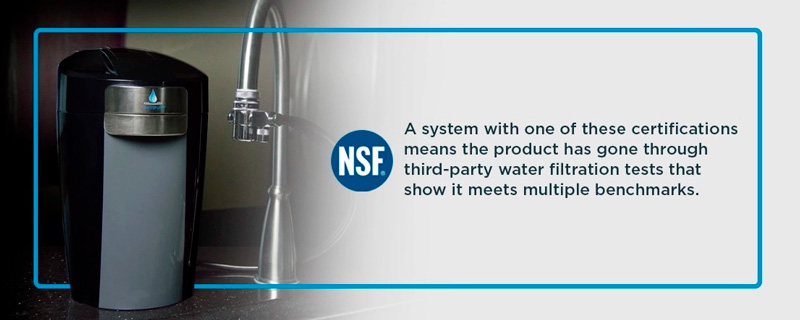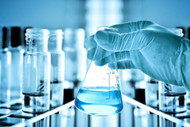NSF: An Overview
Posted by Joel Pelina on Mar 4th 2022

For every product on the market, there are competitors, each with their own particular benefits, aesthetics, and utility. In many cases, the average consumer may have a difficult time distinguishing between multiple products with similar profiles. The key elements, then, become 1. a specific product’s performance claims, and 2. the trust and integrity in the product’s claims. Is this particular product being truthful when it comes to their claims? This is where independent, third-party testing and verification comes in. This is what demonstrates the importance of NSF certification. But to understand why NSF certification is such a mark of distinction, it is important to get a better overview of just what NSF is as an entity.
Founded in 1944 by Walter Snyder, Henry Vaughan, and Nathan Sinai in the University of Michigan School of Public Health, the National Sanitation Foundation is dedicated to the promotion of public health and safety through the performance testing and certification of consumer products. Their first standards and certifications involved the sanitation of soda fountains and luncheonette equipment in 1952. In 1960, they began to test and certify pools, spas, and hot tubs. In 1965, they added plastic piping and wastewater treatment. In 1980, they added water treatment and water distribution systems. Over the years, NSF has expanded their testing and certification standards to encompass appliances, food equipment, drinking water filters, and other consumer health goods. In addition to expanding the scope of their certification, they also expanded their reach to global markets. To reflect this growth, in 1990, they changed their name from the National Sanitation Foundation to NSF International (NSF).
Despite NSF’s growth over their 75+ years of existence, their mission has remained the same: to protect and improve human health. Everything they set out to quantify, to test, and to certify, revolves around the protection and improvement of people’s health and lives. Their core values reflect this, and they serve as a powerful indicator in NSF’s belief in performance, trust, and integrity: Do the Right Thing; Treat People Well; Relentlessly Pursue Excellence; and We Are One NSF.
With those core values at the heart of the company, NSF employs about 3,000 people around the world, including microbiologists, toxicologists, chemists, engineers, and environmental/public health professionals. Today, NSF has laboratories in North America, South America, Europe, and China. They work with other national organizations to develop product performance standards, testing standards, and certification standards that promote public welfare.
The NSF certification process itself is another aspect that separates NSF from other testing and certification entities. NSF drinking water filter certification involves multiple steps over a long period of time – not a simple case of testing water before and after it has been through a water filter. NSF evaluates the product at their own lab, but then follows that up by inspecting the manufacturing and assembly facilities, and sampling and testing products right off the assembly line. These inspections are performed at their convenience, with little-to-no forewarning to the company; in this way, NSF ensures that they are testing a product submitted by the company, a product from the manufacturing center, and a product ready for purchase. Even after the initial product certification, NSF revisits the manufacturing plant to re-test the product in question. NSF’s rigorous testing and certification process ensures that any product they certify is consistent in its quality and performance.
Furthermore, when NSF tests a water treatment product, they test from the first drop of water through – and even beyond – the last drop of water for the filter’s capacity; for example, NSF would test a filter rated at 500 gallons for a minimum of 1000 gallons of water filtration, and likely much more than that. On the other hand, some manufacturers may only test for a few gallons, and publish performance claims based off of a small sample size; in this way, these manufacturers can make broad performance and capacity claims that – while technically true – fail to inform consumers of the very limited scope of their testing.
The most important part of receiving NSF certification for Multipure’s products is that it serves as proof that an impartial entity has reviewed Multipure’s product performance claims. NSF serves as a truly independent third party, with no stake in the results of their testing. As such, the integrity of their findings is beyond reproach, as they are not influenced by the company whose products they are testing. NSF high standards for drinking water treatment products serves as an additional mark of distinction, as it proves that Multipure’s products offer superior protection for your water quality. All of Multipure’s drinking water systems are NSF-certified. This means that:
- Multipure’s product labeling and claims have been verified as accurate
- Multipure is committed to quality, compliance, and safety
- Multipure’s product claims are backed by an independent, international organization dedicated to public health

Multipure is proud to offer customers NSF-certified products, because NSF offers an apples-to-apples comparison with similar water treatment products. When you view the water filtration performance statistics of a Multipure product, you are guaranteed that they are true and accurate, because NSF has certified the product. With a better understanding of NSF, you should realize just how important this can be. With a non-NSF-certified product, do you think you have the same level of trust, quality, and integrity of performance? Would you trust a non-NSF-certified product with your health and safety?

